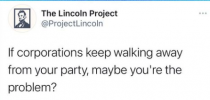Purple and Black
Taking Independent and Unofficial Back
Taking Independent and Unofficial Back
You are using an out of date browser. It may not display this or other websites correctly.
You should upgrade or use an alternative browser.
You should upgrade or use an alternative browser.
Political Hodgepodge
- Thread starter poppy
- Start date
PurpleJedi
Well-Known Member
poppy
Offending Member
(Reuters) - The Manhattan District Attorney’s Office has subpoenaed a New York City property tax agency as part of a criminal investigation into Donald Trump’s company, the agency confirmed on Friday, suggesting prosecutors are examining the former president’s efforts to reduce his commercial real-estate taxes for possible evidence of fraud...
...Along with information already subpoenaed from creditors, the tax agency documents would help investigators determine whether Trump’s business inflated the value of his properties to secure favorable terms on loans while deflating those values to lower tax bills for those same properties.

...Along with information already subpoenaed from creditors, the tax agency documents would help investigators determine whether Trump’s business inflated the value of his properties to secure favorable terms on loans while deflating those values to lower tax bills for those same properties.

poppy
Offending Member
Hate crimes against Asian-Americans are on the rise
The video showing a man attacking a 52-year-old Asian-American woman in New York City is one of many that are a part of the disturbing rise in violence against Asian-Americans. NBC’s Hallie Jackson speaks with assault victim Noel Quintana and co-founder of Stop AAPI Hate Dr. Russell Jeung on data showing a 1900 percent increase in anti-Asian hate crimes since the beginning of the pandemic.poppy
Offending Member
I've heard the pillows are crap too.
npr.org ..."Lindell — a talented salesman and former professional card counter — sells the lie to this day because the lie sells pillows. MyPillow's defamatory marketing campaign — with promo codes like 'FightforTrump,' '45,' 'Proof,' and 'QAnon'—has increased MyPillow sales by 30-40% and continues duping people into redirecting their election-lie outrage into pillow purchases," the complaint reads.
In an interview with The Wall Street Journal, Lindell said he was "very, very happy" to find out about the suit. "I have all the evidence on them," he told the Journal. "Now this will get disclosed faster, all the machine fraud and the attack on our country."...
Social media giant Twitter suspended Lindell from its platform last month.

Dominion Voting Systems Files Defamation Lawsuit Against MyPillow, CEO Mike Lindell
npr.org ..."Lindell — a talented salesman and former professional card counter — sells the lie to this day because the lie sells pillows. MyPillow's defamatory marketing campaign — with promo codes like 'FightforTrump,' '45,' 'Proof,' and 'QAnon'—has increased MyPillow sales by 30-40% and continues duping people into redirecting their election-lie outrage into pillow purchases," the complaint reads.
In an interview with The Wall Street Journal, Lindell said he was "very, very happy" to find out about the suit. "I have all the evidence on them," he told the Journal. "Now this will get disclosed faster, all the machine fraud and the attack on our country."...
Social media giant Twitter suspended Lindell from its platform last month.

Last edited:
poppy
Offending Member

nypost - Orlando, Fla. — A bizarre gold statue of former President Trump clad in sandals and waving a magic wand is currently on sale at CPAC — for anyone with a cool $100,000 to spend.
“He’s wearing a business suit because he’s a business man. The red tie represents the Republican party, the red white and blue shorts represent the fact that he’s a patriot,” the artist Tommy Zegan told The Post. The sandals, he said, reflect how Trump was in his golden years and could be retired and “on the beach” if he wanted to.
PurpleJedi
Well-Known Member
Texas museum removes wax Trump figure after visitors kept punching it

New business idea.....!
poppy
Offending Member
Jeff Tiedrich@itsJeffTiedrich
what kind of shithole country makes it easier to buy a gun than to vote
what kind of shithole country makes it easier to buy a gun than to vote
barnswallow
Well-Known Member
Labor activists had great hopes for the attempt to organize the Amazon warehouse in Bessemer, Ala., and the effort by the Retail, Wholesale and Department Store Union attracted national attention.
For the importance of the topic, maybe this deserves its own thread. But, it's over and done and I'm putting it here to keep a record.Amazon pulled out the same playbook that employers have used since the 1980s: hire an expensive anti-union law firm, shower employees with anti-union literature, force them to sit through anti-union meetings and bombard them with messages about union dues. This is all perfectly legal under a labor-law regime captured by corporations.
Quoting from the NYTimes, 4.15.21 , above and below, from the following article:
The Law Is Rigged Against You if You Want to Unionize
We may be in a period where economic justice concerns are more central to our politics than any time since the mid-20th century. But without a new round of labor law reform, organized labor cannot succeed.
This problem has a very clear solution. The Protecting the Right to Organize Act has become a top priority for Democrats who recognize the importance of unions to their coalition.
It would make many of Amazon’s tactics in Bessemer illegal. The PRO Act would bar mandatory anti-union meetings and other forms of employer interference. Employees could cast their ballot outside of the workplace. It would allow newly formed union locals to go to mediation to get their first contract.
The PRO Act passed the House with near unanimity from Democrats as well as support from a few Republicans. However, the reality of the filibuster means there is almost no chance the PRO Act passes the Senate. So long as Republicans unite in opposition — which, despite anti-corporate rhetorical gestures from the likes of Mitch McConnell, they almost certainly will — it will never come to a vote. Unless moderate Democrats agree to eliminate or reform the filibuster, they are as responsible for this era of corporate domination over workers as their Republican colleagues.
Last edited:
DiminutiveRocker
Well-Known Member
barnswallow
Well-Known Member
barnswallow
Well-Known Member

From History of American Income Tax Rates at a site called 'Outside the Beltway', which I don't know much about. But, it came from a twitter account I trust so I'm posting it without much inspection. Can't be reminded of these trends too often, imo. It makes a person think.
Last edited:
barnswallow
Well-Known Member
barnswallow
Well-Known Member
I thought that the reduction would have been greater under the t---- tax cuts. From Investopedia, Marginal tax rate :

i'm adding another table which shows more years of the 'historical highest marginal income tax rates'.Marginal tax rates can be changed by new tax laws. The current marginal tax rates went into effect in the United States as of Jan. 1, 2018, with the passage of the Tax Cuts and Jobs Act (TCJA). Under the previous law, the seven brackets were 10%, 15%, 25%, 28%, 33%, 35%, and 39.6%. The new plan, signed into law in Dec. 2017, keeps the seven bracket-structure. However, adjustments were made to the tax rates and income levels. Under the TCJA, the new rates are 10%, 12%, 22%, 24%, 32%, 35%, and 37%.

poppy
Offending Member
oooh juicy!Ohh, Lin Wood says he knows something about Lindsey Graham and Drew McKissick:
poppy
Offending Member
Was wondering why I saw photos of him and his butt kissers in front of a giant bed!
Every day is the big day for Donald Trump since he has traded the Oval Office for the bridal suite.
The former president is working out of a converted dressing room in the bridal suite above Mar-a-Lago’s 20,000-square-foot ballroom, according to multiple reports.

yahoo!news
Every day is the big day for Donald Trump since he has traded the Oval Office for the bridal suite.
The former president is working out of a converted dressing room in the bridal suite above Mar-a-Lago’s 20,000-square-foot ballroom, according to multiple reports.

yahoo!news


